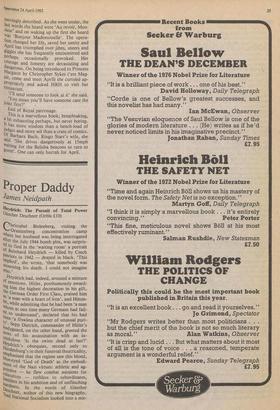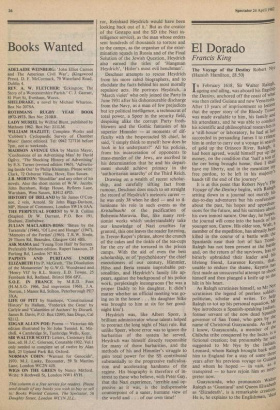Proper Daddy
James Neidpath
Heydrich: The Pursuit of Total Power Gunther Deschner (Orbis f10)
Christabel Bielenberg, visiting the Oranienberg concentration camp where her husband was being interrogated after the July 1944 bomb plot, was surpris- ed to find in the 'waiting room' a portrait °I' Reinhard Heydrich — killed by Czech patriots in 1942 — draped in black. 'This Implied', she wrote, 'that somebody was mourning his death. I could not imagine who.'
Heydrich had, indeed, aroused a mixture of emotions. Hitler, posthumously award- 111,_g him the highest decoration in his gift, the German Order First Class, praised him as 'a man with a heart of iron', and Humm- ler while admitting that he had been 'a man whom at one time many Germans had fail- ed understand', declared that his had tbeen'a flawless character of unusual puri- bc'V SePP Dietrich, commander of Hitler's „uYguard, on the other hand, greeted the news of his assassination with an in- cjedulous 'Is the swine dead at last?' `1,.eYdrich's obsequies, second only to erlindenburg's in their funereal theatricality, uPhasised that the regime saw this blond, e-eYed 'God of Death' as the embodi- °tet of the Nazi virtues: athletic and ag- gressive — he flew combat missions for relaxation — ruthless to subordinates, hinutless in his ambition and of unflinching hardness. In the words of Gunther D,`setiner author of this new biography, had National Socialism looked into a mir-
ror, Reinhard Heydrich would have been looking back out of it.' But as the creator of the Gestapo and the SD (the Nazi in- telligence service), as the man whose orders sent hundreds of thousands to torture and to the camps, as the organiser of the exter- mination squads in Russia and of the Final Solution of the Jewish Question, Heydrich also earned the titles of 'Hangman Heydrich', 'Hitler's most evil henchman'.
Deschner attempts to rescue Heydrich from his more rabid biographers, and to elucidate the facts behind his most morally repulsive acts. He portrays Heydrich, a 'March violet' who only joined the Party in June 1931 after his dishonourable discharge from the Navy, as a man of few prejudices but icy political intelligence, a technocrat of total power, a Speer in the security field, despising alike the corrupt Party froth- blowers and the Gothic fantasies of his superior Himmler — at moments of dif- ficulty with the bespectacled SS chief, he said, 'I simply think to myself: how does he look in his underpants?' All his policies, from his incarceration of opponents to mass-murder of the Jews, are ascribed to his determination that he and his depart- ment should achieve primacy in the `authoritarian anarchy' of the Third Reich.
Drawing on a wealth of recent scholar- ship, and carefully sifting fact from rumour, Deschner does much to set straight the record of Heydrich's meteoric career he was only 38 when he died — and to il- luminate his role in such events as the Kristallnacht or the pacification of Bohemia-Moravia. But, like many revi- sionist works which understandably take our knowledge of Nazi cruelties for granted, this one leaves the reader listening, in Trevor-Roper's phrase, above the crunch of the cakes and the tinkle of the tea-cups for the cry of the tortured in the prison camps. With the aid of even the best scholarship, or of `psychohistory' the chief executioners of our century, Himmler, Hass and Beria remain improbable per- sonalities, and Heydrich's family life ap- pears, against the background of his police work, perplexingly incongruous (`he was a proper Daddy to his daughter. It didn't matter whether an official meeting was go- ing on in the house . . . his daughter Silke was brought to him at six for her good- night kiss').
Heydrich was, like Albert Speer, a brilliant administrator whose talents helped to protract the long night of Nazi rule. But unlike Speer, whose error was to ignore the barbarities of the system he served, Heydrich was himself directly responsible for many of those barbarities, and the methods of his and Himmler's struggle to gain total power for the SS contributed substantially to the progressive radicalisa- tion and accelerating harshness of the regime. His biography is therefore of in- terest to those who believe, with Peter Gay, that the Nazi experience, 'terrible and op- presive as it was, is the indispensable counterpoint of a saner, humane view of the world and . . of our own time!'







































 Previous page
Previous page